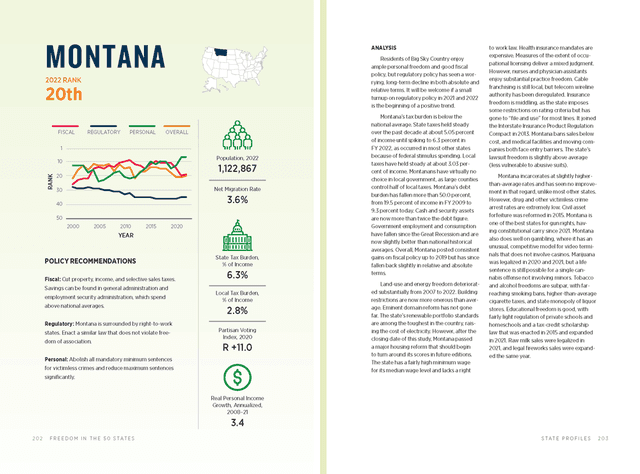Policy Recommendations
- Fiscal Cut property, income, and selective sales taxes. Savings can be found in general administration and employment security administration, which spend above national averages.
- Regulatory Montana is surrounded by right-to-work states. Enact a similar law that does not violate freedom of association.
- Personal Abolish all mandatory minimum sentences for victimless crimes and reduce maximum sentences significantly.
Analysis
Residents of Big Sky Country enjoy ample personal freedom and good fiscal policy, but regulatory policy has seen a worrying, long-term decline in both absolute and relative terms. It will be welcome if a small turnup on regulatory policy in 2021 and 2022 is the beginning of a positive trend.
Montana’s tax burden is below the national average. State taxes held steady over the past decade at about 5.05 percent of income until spiking to 6.3 percent in FY 2022, as occurred in most other states because of federal stimulus spending. Local taxes have held steady at about 3.03 percent of income. Montanans have virtually no choice in local government, as large counties control half of local taxes. Montana’s debt burden has fallen more than 50.0 percent, from 19.5 percent of income in FY 2009 to 9.3 percent today. Cash and security assets are now more than twice the debt figure. Government employment and consumption have fallen since the Great Recession and are now slightly better than national historical averages. Overall, Montana posted consistent gains on fiscal policy up to 2019 but has since fallen back slightly in relative and absolute terms.
Land-use and energy freedom deteriorated substantially from 2007 to 2022. Building restrictions are now more onerous than average. Eminent domain reform has not gone far. The state’s renewable portfolio standards are among the toughest in the country, raising the cost of electricity. However, after the closing date of this study, Montana passed a major housing reform that should begin to turn around its scores in future editions. The state has a fairly high minimum wage for its median wage level and lacks a right to work law. Health insurance mandates are expensive. Measures of the extent of occupational licensing deliver a mixed judgment. However, nurses and physician assistants enjoy substantial practice freedom. Cable franchising is still local, but telecom wireline authority has been deregulated. Insurance freedom is middling, as the state imposes some restrictions on rating criteria but has gone to “file and use” for most lines. It joined the Interstate Insurance Product Regulation Compact in 2013. Montana bans sales below cost, and medical facilities and moving companies both face entry barriers. The state’s lawsuit freedom is slightly above average (less vulnerable to abusive suits).
Montana incarcerates at slightly higher-than-average rates and has seen no improvement in that regard, unlike most other states. However, drug and other victimless crime arrest rates are extremely low. Civil asset forfeiture was reformed in 2015. Montana is one of the best states for gun rights, having constitutional carry since 2021. Montana also does well on gambling, where it has an unusual, competitive model for video terminals that does not involve casinos. Marijuana was legalized in 2020 and 2021, but a life sentence is still possible for a single cannabis offense not involving minors. Tobacco and alcohol freedoms are subpar, with far-reaching smoking bans, higher-than-average cigarette taxes, and state monopoly of liquor stores. Educational freedom is good, with fairly light regulation of private schools and homeschools and a tax-credit scholarship law that was enacted in 2015 and expanded in 2021. Raw milk sales were legalized in 2021, and legal fireworks sales were expanded the same year.

